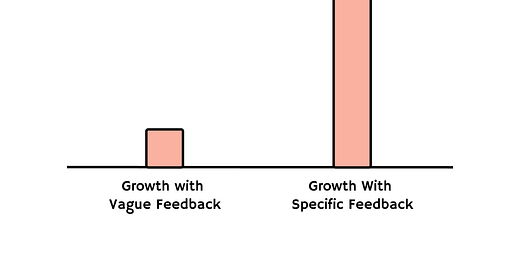Feedback is a gift only if it is received well.
Avoid these Five mistakes when Seeking Feedback
Feedback can benefit or hinder, depending on one's mindset.
Early in my career, I often reacted defensively and dismissed feedback.
This hindered my growth significantly; missed opportunities stemmed from either disregarding or poorly accepting feedback.
However, learning to accept feedback effectively transformed my career trajectory. Within 3 years, I ascended from mid-level to Staff Software Engineer, largely due to embracing feedback and continually improving.
There are many resources and articles on how to give feedback, but few on how to receive it.
Here are five mistakes I have made while asking for feedback, so you don't have to:
1. Not Seeking Specific Feedback
Stop asking: "Do you have any feedback for me?"
Why: You might hear generic replies like, "Keep it up. You're doing well."
Data shows 21% of managers avoid uncomfortable conversations.
Giving and receiving feedback can be uncomfortable. Let's make it easier for feedback providers.
Instead of generic questions, ask for specifics.
Example prompts you can use:
if working on communication skills:
“How was my communication with stakeholders during the last project?”
if improving coding skills:
"Have you noticed any patterns in my PRs? Any areas I should focus on? Recommended resources?"
If new to a team, inquire:
"How did I handle gathering requirements through questions? Any room for improvement?"
Seeking project design feedback:
“Thoughts on the readability of my design document?”
OR
“How could I improve my presentation to a larger audience?”
After addressing specifics, invite feedback on other aspects by generic questions.
2. Not Seeking Real-Time Feedback
You can bring something in progress for feedback, not necessarily from the past.
This helps you receive feedback on your thought process or approach.
Why:
It allows for immediate action, and we often learn from others who've been through similar situations.
This method has helped me avoid many mistakes and learn from others' experiences.
For example:
While refining my feedback-giving skills, I discussed my approach with my manager. I typically use the sandwich method but realized feedback sometimes gets lost, leaving only the positives.
Through our dialogue, I recognized I don't allocate enough time to feedback and focus more on positives. This makes the constructive part seem insignificant to the listener.
This discussion highlighted my blind spots, prompting further research on feedback techniques.
3. Seeking Validation and not Feedback
Asking for feedback just to get a pat on the back instead of real advice can stop you from getting better.
For example:
Using leading questions like, "Wasn't that presentation fantastic?" may prompt only positive responses, even if improvement areas exist.
Instead, ask:
"What areas could I have improved during the presentation?" or "Any suggestions for a different approach next time?"
It's normal to seek validation. But it's important to tell apart praise from real feedback for meaningful progress.
4. Ignoring non-verbal cues
Not paying attention to body language can make you miss important signs.
Even though it might be tough, especially when you're working from home, you can still catch these signs.
For example:
If someone seems unsure or avoids looking at you when giving feedback, you can mention their body language by saying:
"I noticed you paused before mentioning that. Is there something you're not sure about?"
This lets them know you're serious about feedback and encourages them to share more openly.
5. Getting defensive
I have been guilty of this many times. However, when you understand that:
the lack of some skill isn't a permanent flaw but a temporary challenge waiting to be conquered,
it will change your perspective towards feedback.
I suggest reading Mindset - by Carol Dweck, which helped me in managing anxiety when faced with areas of weakness.
While I still get defensive occasionally, it has significantly decreased.
I hope these tips help you get the right feedback and discover your blind spots.
But getting a ton of feedback can feel like too much if you're not sure how to handle it.
In the next article:
I'll discuss what to do with all the feedback you've received. Keep an eye out! :)
If you enjoyed this article, then hit the ❤️ button and share it with a friend or coworker who might find it useful too!
Did I overlook anything important? Feel free to drop a comment 🙋♀️🙋♂️
Thanks for being here,
Omsai Jadhav





Often, it’s believed that the only person responsible for providing feedback is the one who has to give it, but everything actually starts with the person who requests it.
Thanks Omsai!
Great article! 👍
The reason I do my 1:1 in person rather online, is also related to lack of body language on a virtual call. Especially while talking on complicated situations or giving out difficult feedbacks.
An engineer being proactive on their feedback is great! It help the manager to understand better the individual needs and makes the conversation two sided.